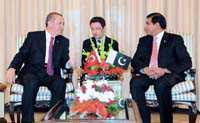Jennifer Lopez is Coming to Istanbul, Not to Perform but to Live

ISTANBUL, November 22, 2012 /PRNewswire/ — The world-famous Latin singer Jennifer Lopez, who performed three concerts in Istanbul recently, has returned to Turkey after her performance in Sofia and become one of the residents of Metropol Istanbul in Atasehir Finance Centre. The pop star received the key to her flat with a Bosphouros and islands view during a ceremony organized in the sales office.
Lopez said that she was very impressed by the Metropol Istanbul Project and that she could see at first sight that it will be the new fashion and finance centre of Istanbul. Certain that she wanted to have a flat in this Project, she returned to Istanbul without delay after her performance in Sofia.
Metropol Istanbul, which consists of a 250 metre high tower that will be one of the highest buildings in Europe, residence blocks and a luxury 400 metre shopping street, is located on a two storey shopping complex over an area of 200 thousand square metres, and continues to draw attention in the international area.
“I am very curious about the Catwalk”
Jennifer Lopez visited the Metropol Istanbul sales office on November 19th, 2012, and closely examined the Project. before buying a property on the same day. A key delivery ceremony was performed with the participation of the press members and to great interest of Lopez fans.
In the ceremony, the Chairman of the Çalik Construction Group, Mr. Ahmet Taçyildiz, and Varyap CEO, Mr. Erdinç Varlibas, delivered the key and the title documents to Jennifer Lopez. Lopez, stating that she is very happy to have a flat in Metropol Istanbul, said: “In the future, I want to spend more time in Istanbul which I admire. I will use my flat in Metropol Istanbul during these visits. I am already excited about looking at the unique view of the Bosphorus and Prince islands from my flat. I am very curious about the 400 metre long shopping street, the Metropol Catwalk in the Project”.
About Metropol Istanbul
Metropol Istanbul, to be completed in 2015, will be one of the biggest mixed projects in the world in its class with its residence, shopping centre and recreation areas. Metropol Istanbul is rising as one of the biggest projects of the world with the single plot construction area of 700 thousand square meters, consisting of three high buildinsg and about 2000 independent units. In the project, where the 250 metre (without antenna) tall Metropol Tower will be launched, 75 % of the residence blocks marketed have been sold. Metropol Istanbul is preparing to be the new centre of finance, business world and fashion. Metropol Shopping Centre contains the Metropol Catwalk which is the 400 metre long shopping centre that can be easily accessed in an integrated structure and is expected to accommodate 22 million visitors annually.
For Information:
Bersay Iletisim Danismanligi
Sibel Kahraman
sibel.kahraman@bersay.com.tr
Tel: 0212-377-52-35
Mobile: 0554-535-49-83
via Jennifer Lopez comes to Istanbul this time not for a concert but for buying a house.




